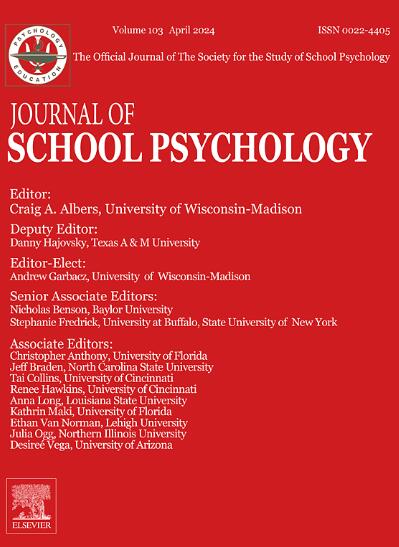通过实施计划,支持辅助教育工作者遵守行为支持计划
IF 4.1
1区 心理学
Q1 PSYCHOLOGY, SOCIAL
引用次数: 0
摘要
辅助教育工作者的任务是为有复杂需求的学生提供行为支持,但在这方面的准备有限。新兴的研究表明,辅助教育工作者需要不同程度的实施支持,但很少有实施策略被辅助教育工作者评估,而且大多数是资源密集型的,限制了它们的可行性。实施计划是一种可行的、低资源的、主动的或按需的忠诚支持,有证据表明其对课堂教师和家长的有效性。本研究采用跨参与者的多基线单案例实验设计来调查提供实施计划对辅助教育工作者对现有行为支持计划(BSPs)忠实度的影响。相关的学生成果(即,学业投入和破坏性行为)也进行了探讨。本研究的参与者包括三名辅助教育工作者和三名来自美国东北部一个大型郊区的一所小学(PK-2年级)的学生。总体而言,在提供实施计划之后,所有辅助教育工作者对bsp的忠诚度都有所提高,平均高于80%。一名辅助教育工作者符合标准,可以获得额外的实施支持并收到绩效反馈。对BSP的忠诚度提高后,学生的成绩也有所改善。可以根据需要应用实施计划,以支持辅助教育工作者在分层框架内更一致地提供bsp。本文章由计算机程序翻译,如有差异,请以英文原文为准。
Supporting paraeducators' adherence to behavior support plans through implementation planning
Paraeducators are tasked with providing behavior support to students with complex needs but have limited preparation to do so. Emerging research suggests paraeducators require different levels of implementation support, yet few implementation strategies have been evaluated with paraeducators and most are resource intensive, limiting their feasibility. Implementation planning is a feasible, low-resource, proactive, or as-needed, fidelity support with evidence for its effectiveness with classroom teachers and parents. The present study employed a multiple baseline across participants single case experimental design to investigate the effects of providing implementation planning on paraeducators' fidelity to existing behavior support plans (BSPs). Related student outcomes (i.e., academic engagement and disruptive behavior) were also explored. Participants of the present study included three paraeducators and three students recruited from one elementary school (grades PK-2) in a large suburban district in the Northeast region of the U.S. Overall, all paraeducators' fidelity to the BSPs increased and were above 80 %, on average, following provision of implementation planning. One paraeducator met criteria to receive additional implementation support and received performance feedback. Student outcomes improved after fidelity to BSP increased. Implementation planning can be applied as needed to support paraeducators to more consistently deliver BSPs within a tiered framework.
求助全文
通过发布文献求助,成功后即可免费获取论文全文。
去求助
来源期刊

Journal of School Psychology
PSYCHOLOGY, EDUCATIONAL-
CiteScore
6.70
自引率
8.00%
发文量
71
期刊介绍:
The Journal of School Psychology publishes original empirical articles and critical reviews of the literature on research and practices relevant to psychological and behavioral processes in school settings. JSP presents research on intervention mechanisms and approaches; schooling effects on the development of social, cognitive, mental-health, and achievement-related outcomes; assessment; and consultation. Submissions from a variety of disciplines are encouraged. All manuscripts are read by the Editor and one or more editorial consultants with the intent of providing appropriate and constructive written reviews.
 求助内容:
求助内容: 应助结果提醒方式:
应助结果提醒方式:


